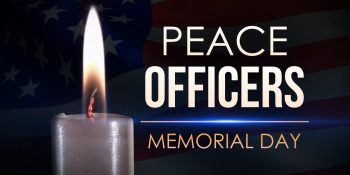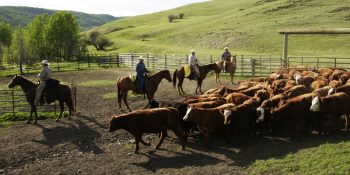DENVER – Today, Gov. Polis ordered the Colorado and American flags be lowered to half staff on all public buildings statewide from sunrise to sunset on Friday, May 15, 2020, in recognition of Peace Officers Memorial Day, and as proclaimed by President Trump.
PEACE OFFICERS MEMORIAL DAY AND POLICE WEEK, 2020
BY THE PRESIDENT OF THE UNITED STATES OF AMERICA
A PROCLAMATION
On Peace Officers Memorial Day and during Police Week, we commend the brave men and women of our law enforcement community for continually summoning the courage to fulfill their solemn oath to protect and serve. We also pause to remember all those who have lost their lives and who have suffered permanent disabilities defending their communities and the rule of law, including the heroes we have lost this year to the coronavirus.
Throughout our Nation’s history, law enforcement officials have never wavered in the face of crisis or tragedy. During uncertain times, law enforcement officers bravely face challenges and continue to protect the American people. They steadfastly ensure the safety of our communities, providing a much needed sense of security for our citizens, and our country is extremely grateful for their efforts.
My Administration remains committed to ensuring our Nation’s Federal, State, local, and tribal law enforcement officers have the resources and support they need to perform their duties safely and effectively. Last October, I was proud to sign an Executive Order to establish the Presidential Commission on Law Enforcement and the Administration of Justice — the first commission on law enforcement in half a century. This Commission identifies ways to reduce crime while simultaneously bringing law enforcement officers and the communities they serve closer together. We have also worked to expand lifesaving programs like the National Blue Alert Network. Thirty-five States have enacted Blue Alert plans, which provide early warnings to law enforcement agencies, the media, and the public by transmitting Blue Alerts to cell phones, television stations, and other devices. These alerts disseminate information on suspects who pose an imminent and credible threat to the safety of our officers, and this network demonstrates how we can work together to provide proactive programs, innovative resources, and cutting-edge technology to support and advance our law enforcement personnel.
We must continue working toward a time when all people respect and understand the important work that law enforcement officers do. Unfortunately, our law enforcement officers do not always receive the respect they deserve. These brave men and women must operate in an environment where their moral and legal authority is constantly being scrutinized, and they undertake the critical yet difficult task of addressing the actions of those affected by addiction, homelessness, and mental illness. Their ability to work well in the face of these and other challenges is extraordinary, and we have incredible appreciation for their public service and selflessness.
On behalf of our grateful Nation, we proudly recognize the more than 900,000 sworn members of law enforcement for their resolve and dedication in the face of dangerous uncertainty. The thoughts and prayers of our Nation are with them and their families, and we will always owe them our appreciation and support.
By a joint resolution approved October 1, 1962, as amended (Public Law 87-726, 76 Stat. 676), and by section 1 of Public Law 105-225 (36 U.S.C. 136-137), the President has been authorized and requested to designate May 15 of each year as “Peace Officers Memorial Day” and the week in which it falls as “Police Week.”
NOW, THEREFORE, I, DONALD J. TRUMP, President of the United States of America, do hereby proclaim May 15, 2020, as Peace Officers Memorial Day and May 10 through May 16, 2020, as Police Week. In honor of our hardworking law enforcement officers, Melania and I will light the White House in blue on May 15, 2020. I call upon all Americans to observe Peace Officers Memorial Day and Police Week with appropriate ceremonies and activities. I also call on the Governors of the States and Territories and officials of other areas subject to the jurisdiction of the United States, to direct that the flag be flown at half-staff on Peace Officers Memorial Day. I further encourage all Americans to display the flag from their homes and businesses on that day.
IN WITNESS WHEREOF, I have hereunto set my hand this eighth day of May, in the year of our Lord two thousand twenty, and of the Independence of the United States of America the two hundred and forty-fourth.
DONALD J. TRUMP
SPREAD THE NEWS
COMMENT, Like, Follow & SHARE @I70Scout
CURRENT EDITION
WEATHER & TRAFFIC PUZZLES RECENT NEWS ADVERTISE WITH US








